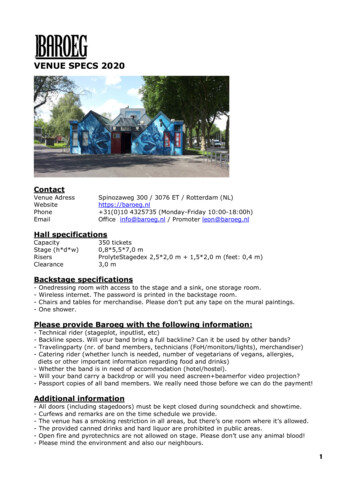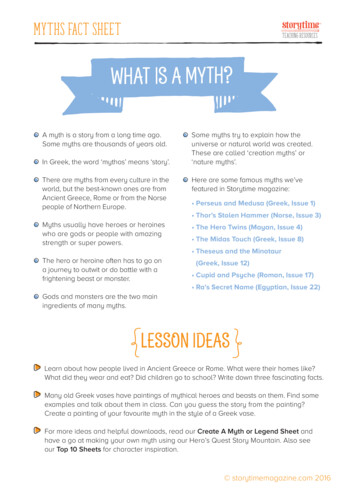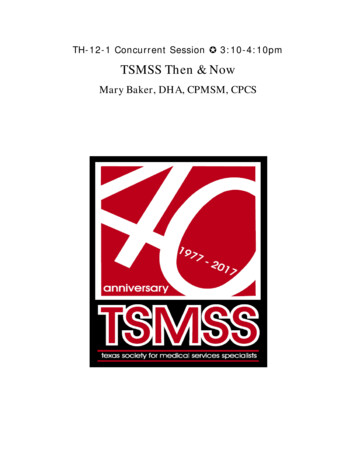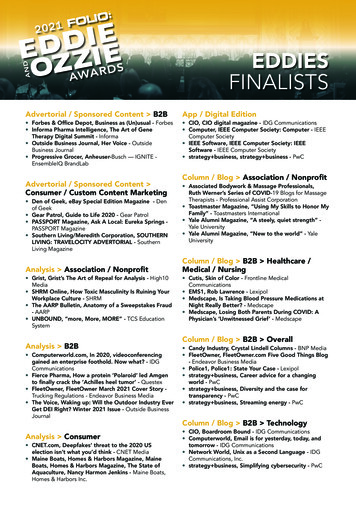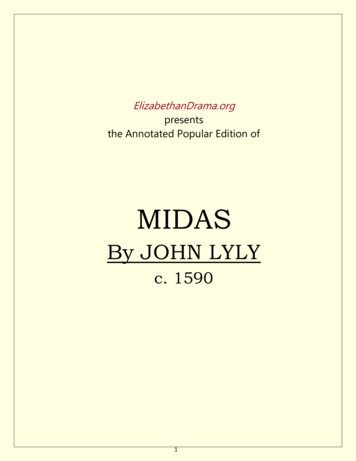
Transcription
ElizabethanDrama.orgpresentsthe Annotated Popular Edition ofMIDASBy JOHN LYLYc. 15901
MIDASBy JOHN LYLYc. 1590PLAIED BEFORE THE QVEENES MAIESTIEUPON TVVELFE DAY AT NIGHT,BY THE CHILDREN OF PAULES.INTRODUCTION to the PLAYMidas was a play written later in Lyly's career as a dramatist,and as such it does not suffer as greatly from the heavilyaffected style known as euphuism which permeated his earlierworks to an almost stifling level. Our play treats the twin talesof the famous King Midas, who first made the mistake ofasking for the gift of the golden touch, and then made a secondmistake in deciding against an Olympian god in a musicalcontest.DRAMATIS PERSONAE.Midas, King of Phrygia.Sophronia, daughter of Midas.Counselors of Midas:Eristus.Martius.Mellacrites.Petulus, Page to MellacritesCelia, daughter of Mellacrites.Pipenetta, Maid to Celia.Licio, Page to Celia.OUR PLAY'S SOURCEThe text of the play is taken from R. Warwick Bond's editionof The Complete Works of John Lyly (footnote #9 below).Minutius, another Page.NOTES ON THE ANNOTATIONSReferences in the annotations to "Fairholt" refer to thenotes supplied by editor F.W. Fairholt to Midas in his 1858collection of Lyly's work, cited at #16 below.References in the annotations to "Bond" refer to the notessupplied by editor R. Warwick Bond to Midas in his 1902collection of Lyly's work, cited at #9 below.References in the annotations to "Daniel" refer to the notessupplied by editor Carter Daniel to Midas in his 1988collection of Lyly's dramatic output, cited at #5 below.The most commonly cited sources are listed in thefootnotes immediately below. The complete list of footnotesappears at the end of this play.1. Oxford English Dictionary (OED) online.2. Crystal, David and Ben. Shakespeare's Words. London;New York: Penguin, 2002.4. Smith, W., ed. A Dictionary of Greek and RomanBiography and Mythology. London: John Murray, 1849.5. Daniel, Carter A., ed. The Plays of John Lyly.Lewisburg: Bucknell University Press, 1988.6. Latin translations by Quintus, whose services may befound at http://the latintranslator.com/.9. Bond, R. Warwick, ed. The Complete Works of JohnLyly, Vol. II. Oxford: The Clarendon Press, 1902.12. Humphries, Rolfe, trans. Ovid. Metamorphoses.Bloomington: Indiana University Press, 1983.16. Fairholt, F.W., ed. The Dramatic Works of John Lilly,Vol. II. London: John Russell Smith, 1858.The elthus.Dryapon.Amyntas.Motto, a Barber.Dello, his Boy.A Huntsman.Erato, a Nymph.Other Nymphs.Ladies of the Court:Camilla.Amerula.Suavia.Scene: Phrygia and Delphi.2
Editor's Note: Lyly's EuphuismIn 1578, John Lyly wrote and published a romantic novelcalled Euphues, or the Anatomy of Wit. The book was asensation in Elizabethan England, but not so much for itsstory as for its language. Lyly, inspired by a similar styleemployed by the Englishman George Pettie in his novel, APetite Pallace of Pettie His Pleasure (published in 1576),wrote in a highly affected manner that became the rage ofLondon's upper crust.The style, which was called euphuism, consisted of threekey elements: (1) the continuous use of short parallel phraseswith lots of word play, (2) frequent use of alliteration, and (3)references to fantastic creatures and clearly fictitious "facts"about the natural world, borrowed from works such as Plinythe Elder's Natural History.Euphuism, like anything else that becomes suddenlyfashionable, had a short shelf-life, but Lyly continued to usethe style throughout his dramatic works. Admittedly, whilehis earlier plays employed euphuism to an almost suffocatingdegree, by the time he wrote Midas he had toned down hisdependence on it significantly.Lyly's works are fun to read, but not for long periods oftime, as euphuism can become ponderous and tiresome after awhile. Taken in small bites, however, euphuism can beamusing, and represents a delightful and interesting peek intoone of the more unusual episodes of English literary history.3
Prologue: the play would have been rehearsed at St. Paul's infront of a small paying public, and would subsequently beperformed for the Queen and the Court.9 Daniel notes thatthe tone of the Prologue is somewhat more sassy than theone Lyly would likely present before Elizabeth.5THE PROLOGUE IN PAUL'S.1246810121416182022GENTLEMEN, so nice is the world, that forapparel there is no fashion, for music no instrument,for diet no delicate, for plays no invention, butbreedeth satiety before noon, and contempt beforenight. fussy or fickle1; in this paragraph, Lyly uses severalmetaphors to describe how hard it is to please the public.3: delicate ie. delicacies.1invention ideas.4: breedeth satiety ie. the public will have had its fill.Come to the tailor, he is gone to the painters, tolearn how more cunning may lurk in the fashion, thencan be expressed in the making. Ask the musicians,they will say their heads ache with devising notesbeyond Ela. Inquire at ordinaries, there must be saladsfor the Italian; picktooths for the Spaniard; pots for theGerman; pottage for the Englishman. At our exercises,soldiers call for tragedies, their object is blood:courtiers for comedies, their subject is love;countrymen for pastorals, shepherds are their saints.Traffic and travel hath woven the nature of all nationsinto ours; and made this land like arras, full of device;which was broad-cloth, full of workmanship.6-16: In this paragraph, Lyly bemoans the difficult timepersons in the service industries have in trying tosatisfy their customers.7: cunning skill; Several ancient sources confirm thattailors sometimes consulted with artists over how tomake their designs more attactive.1610: Ela a very high note, an "E" in the "la" position.1ordinaries taverns where food is served for a fixedprice.11: picktooths a Mediterranean plant whose umbels couldbe used as toothpicks.1 Toothpicks were considereda foreign affectation in Lyly's days. In Shakespeare'sKing John, a character known as the Bastard mocksthe proverbial international traveler "and his toothpickat my worship's mess" (Act I, i).pots tankards for drinking.12: pottage stew or porridge.our exercises ie. the performances of Lyly's plays;each segment of society demands plays to satisfy itsown particular tastes.14: courtiers pursuers of women, usually applied tomembers of a sovereign's court.15: countrymen ie. those who live in the country.pastoral a literary genre, usually revolving aroundrural themes in general and shepherds in particular.16-17: Traffic ours international trade and travel havenoticeably influenced English culture.17: arras the French city Arras was famous for itsdelightful and colorful tapestries, so much so that thename arras came to mean tapestries in general. Lylycontinues the metaphor begun with woven in theprevious line.full of device the image is of a colorful tapestry filledwith various ideas (device) and scenes.18: which was workmanship Lyly describes Englandas a plain cloth (broadcloth) that has becomeenriched and more interesting, thanks to thosewho have introduced new fashions and ideasthrough their trade and travel. The arras imagecorresponds nicely with the American notion ofthe United States as a melting pot.Time hath confounded our minds, our minds thematter; but all commeth to this pass, that whatheretofore hath been served in several dishes for afeast, is now minced in a charger for a gallimaufrey. If19: confounded confused or mixed up.119-20: our minds the matter ie. "and our minds havemixed up the matter". Note how in the remainder of theparagraph, the idea of "mixing up" is applied both4
2426283032we present a mingle-mangle, our fault is to be excused,because the whole world is become an hodge-podge.literally to food and metaphorically to the world.21: several individual.22: charger large plate.1gaillimaufrey stew made up of odds and ends.123: mingle-mangle mishmash.124: hodge-podge mishmash, sometimes written ashotchpotch.1We are jealous of your judgments, because youare wise; of our own performance, because we areunperfect; of our author's device, because he is idle.Only this doth encourage us, that presenting ourstudies before gentlemen, though they receive aninward mislike, we shall not be hissed with an opendisgrace.25: jealous anxious for.527: our author's Lyly's, a cute bit of self-reference.device conception.idle Bond notes that Lyly may have authoredMidas after a break of several years from writing.929-31: though they disgrace a sentiment which Lylytypically expresses in his prologues: even if theaudience dislikes the play, he hopes they will notbe so callous as to demonstrate their displeasure tooovertly.32: "A rough lineage is a nettle; a well-born lineage is arose."6 Daniel sees the nettle, a wild plant, as representingthe rough crowd in public theaters, and the rose as thecultured crowd of St. Paul's (Daniel, p. 372).5Stirps rudis urtica est; stirps generosa, rosa.5
ACT I.SCENE I.The gardens before Midas’ palace.Enter Bacchus, Midas, Eristus, Martius Entering characters: Bacchus is the Roman god of wine.Midas is the King of Phrygia, a land located in what isand Mellacrites.now western Turkey. Eristus, Martius and Mellacritesare advisors to the king.1Bacc. Midas, where the gods bestow benefits they ask2thanks, but where they receive good turns, they give468101214rewards. Thou hast filled my belly with meat, mineears with music, mine eyes with wonders. Bacchus ofall the gods is the best fellow, and Midas amongst mena king of fellows. All thy grounds are vineyards, thycorn grapes; thy chambers cellars, thy household stuffstanding cups: and therefore ask anything, it shall begranted. Wouldest thou have the pipes of thy conductsto run wine, the udders of thy beasts to drop nectar, orthy trees to bud ambrosia? Desirest thou to befortunate in thy love, or in thy victories famous, or tohave the years of thy life as many as the hairs on thyhead? Nothing shall be denied, so great is Bacchus, sohappy is Midas.1-3: where rewards the relationship between theancients and their gods was one of quid pro quo:humans prayed and performed sacrifices to the gods,and in return the gods were expected to protect andeven bring good fortune to those who honor them. turns used to mean "acts" or "deeds"1, and survives inthe phrase "to do a good turn"; the 16th century writerJohn Heywood published a famous book of proverbs in1538, in which was included the still familiar "one goodturn asketh another." Midas has been entertaining the god. corn could refer, as it does here, to the fruit or seed ofvarious plants, such as grape.1chambers cellars "your rooms all serve as winecellars". a standing cup was a drinking vessel with a base.1 conduits or fountains.1 the drink of the gods. the food of the gods. fortunate1618Midas. Bacchus, for a king to beg of a god it is noshame, but to ask with advice, wisdom; give me leave20to consult: lest desiring things above my reach, I befired with Phaeton: or against nature, I be drownedwith Icarus: and so perishing, the world shall both6 ie. for a king to get advice from others before making arequest from a god shows his wisdom. beyond. fired is burnt; Phaeton was the son of Helios, the sungod. As an adolescent, Phaeton begged his father to lethim drive the chariot that pulled the sun across the skyfor one day. After much begging, Helios reluctantlyacquiesced, but warned his son to be careful. Phaetoncould not control the horses, and would have crashedonto the earth had not Zeus killed him with athunderbolt.7 the reference is to the story of Daedalus, the famousAthenian craftsman, who for some crime was banishedfrom Athens and went to Crete to serve King Minos, forwhom he built the famous Labyrinth. When Daedalusadvised the Greek hero Theseus how to enter and exit theLabyrinth (in order to kill the monstrous Minotaur), theKing imprisoned Daedalus with his son Icarus. Daedalusfashioned wings for himself and his son out of feathers
22laugh and wonder, crying, Magnis tamen excidit ausis.24Bacc. Consult, Bacchus will consent.26Midas. Now, my lords, let me hear your opinions;what wish may make my days most happy, and hissubjects best content?28303234held together with wax, and the pair used the wings to flyaway and escape Crete. Icarus, unfortunately, did notheed his father's advice not to fly too high, and the sunmelted the young man's wings, causing him to plungeto his death in the sea.722: Latin "Yet he failed in his great ventures." 6 The line isfrom Ovid's Metamorphoses, Book II.Erist. Were I a king I would wish to possess mymistress, for what sweetness can there be found in life,but love? whose wounds the more mortal they are tothe heart, the more immortal they make the possessors:and who knoweth not that the possessing of that mustbe most precious, the pursuing whereof is so pleasing.3646Mar. Love is a pastime for children, breeding nothingbut folly, and nourishing nothing but idleness. I wouldwish to be monarch of the world, conqueringkingdoms like villages, and being greatest on the earthbe commander of the whole earth: for what is therethat more tickles the mind of a king, then a hope to bethe only king, wringing out of every country tribute,and in his own to sit in triumph? Those that callconquerors ambitious, are like those that term thriftcovetousness, cleanliness, pride, honesty, preciseness.48Command the world, Midas, a greater thing youcannot desire, a less you should not.50Midas. What say you, Mellacrites?52Mell. Nothing, but that these two have said nothing. Iwould wish that everything I touched might turn togold: this is the sinews of war, and the sweetness of384042445456586062peace. Is it not gold that maketh the chastest to yield tolust, the honestest to lewdness, the wisest to folly, thefaithfullest to deceit, and the most holy in heart, to bemost hollow of heart? In this word gold are all thepowers of the gods, the desires of m
Midas was a play written later in Lyly's career as a dramatist, . The complete list of footnotes appears at the end of this play. 1. Oxford English Dictionary (OED) online. 2. Crystal, David and Ben. Shakespeare's Words. London; New York: Penguin, 2002. 4. Smith, W., ed. A Dictionary of Greek and Roman Biography and Mythology. London: John Murray, 1849. 5. Daniel, Carter A., ed. The Plays of .

